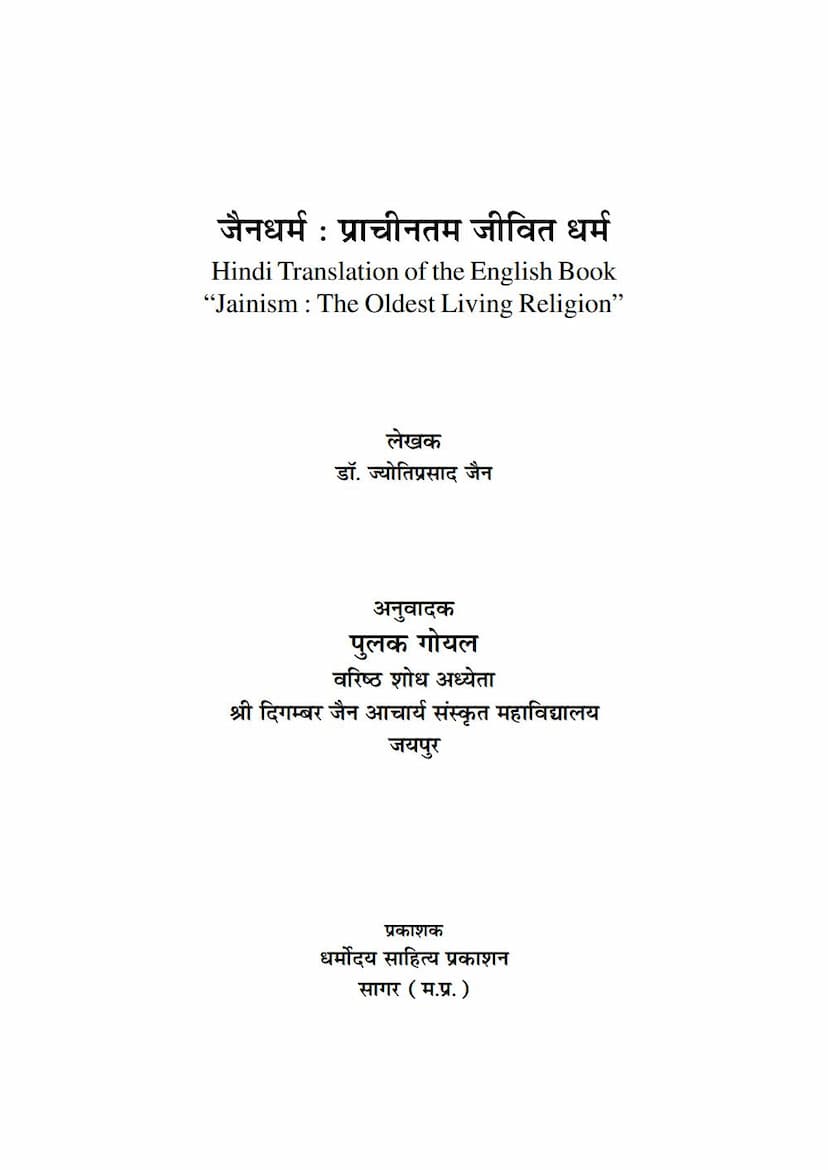Jain Dharm Prachintam Jivit Dharm
Added to library: September 1, 2025

Summary
This document is a Hindi translation of the English book "Jainism: The Oldest Living Religion" by Dr. Jyotiprasad Jain. The publisher is Dharmoday Sahitya Prakashan, Sagar (M.P.).
The book aims to clarify and rectify misconceptions about the antiquity and historical authenticity of Jainism. It argues that Jainism is one of the oldest living religions, predating even Buddhism and Vedic traditions.
The author, Dr. Jyotiprasad Jain, addresses various historical and scholarly perspectives on Jainism, citing numerous scholars and their findings to support the claims of Jainism's ancient origins.
Key points and arguments presented in the text include:
- Ancient Origins: The book asserts that Jainism's roots go back to the dawn of civilization, and its antiquity has been proven by historians based on available evidence. It counters the notion that Jainism is a derivative religion.
- Critique of Early European Scholarship: The text criticizes early European scholars who, with their limited understanding and reliance on secondary sources or biased accounts, failed to accurately represent Jainism. They often focused on Buddhism and Brahmanism, neglecting Jainism as a distinct and ancient tradition.
- Evidence for Jainism's Antiquity:
- Jain Texts: The inherent traditions within Jain scriptures are presented as reliable evidence.
- Buddhist Literature: Mentions of Mahavira (as Nigantha Nataputta) in Buddhist texts, alongside references to his followers and the existing Nigantha order, suggest Jainism was a well-established and influential tradition concurrent with Buddhism, and possibly older.
- Mutual Conversions: Accounts of people converting between Buddhism and Jainism indicate the presence and influence of both religions as independent entities.
- Jain Philosophical Concepts: The text highlights unique Jain philosophical tenets like omniscient belief, absence of a creator God, concepts of Dharma and Adharma, the six eternal substances, and the doctrine of Karma, suggesting an independent and ancient development.
- Influence of Jainism on Buddhism: It is argued that Buddhism borrowed certain terms and concepts from Jainism, such as "Asrava" and "Samvara."
- Testimony of Scholars: Numerous scholars, including Dr. Hermann Jacobi, Prof. Rhys Davids, E.W. Hopkins, Prof. Max Muller, and others, are cited to support the claim that Jainism is older than Buddhism.
- Historicality of Tirthankaras:
- Parshvanatha: The text strongly supports the historicity of the 23rd Tirthankara, Parshvanatha, who lived approximately 250 years before Mahavira. Evidence suggests his teachings were widespread and influential.
- Neminatha: The 22nd Tirthankara, Neminatha, is presented as a historical figure, a cousin of Lord Krishna, with evidence found in Vedic and Puranic literature. His connection to the Yadu dynasty and Dwarka is discussed.
- Rishabhadeva: The first Tirthankara, Rishabhadeva (also known as Adinath), is argued to be the founder of Jainism and a historical figure. His mention in Vedic texts, Puranas, and his association with the name "Bharatvarsha" are highlighted.
- Jainism as an Independent Religion: The book emphasizes that Jainism is a fundamentally independent system, distinct from Hinduism and Buddhism. Its core principles, such as absolute non-violence, soul-centric philosophy, denial of a creator, and the doctrine of karma, are presented as unique and original.
- Jain Influence on Indian Culture: The text suggests that Jainism has significantly contributed to Indian culture and philosophy, influencing other traditions.
- Pre-Vedic Origins: The book explores the possibility that Jainism's origins predate the Vedic period, drawing connections with the Indus Valley Civilization and its artistic and religious practices, such as the worship of yogis, the naked ascetic figures, and the kayotsarga posture.
- The Name "Bharatvarsha": The text posits that the country was named Bharatvarsha after Rishabhadeva's son, Bharat, and not after the son of Dushyanta and Shakuntala, as commonly believed.
- Jainism's Enduring Nature: The book concludes by highlighting Jainism's remarkable ability to survive and maintain its integrity despite centuries of interaction and influence from other religions, making it a uniquely enduring and ancient spiritual tradition.
In essence, the book "Jain Dharm: Prachintam Jivit Dharm" (Jainism: The Oldest Living Religion) is a scholarly defense of Jainism's profound antiquity and its status as a distinct and independent religious tradition, supported by extensive historical, textual, and scholarly evidence.